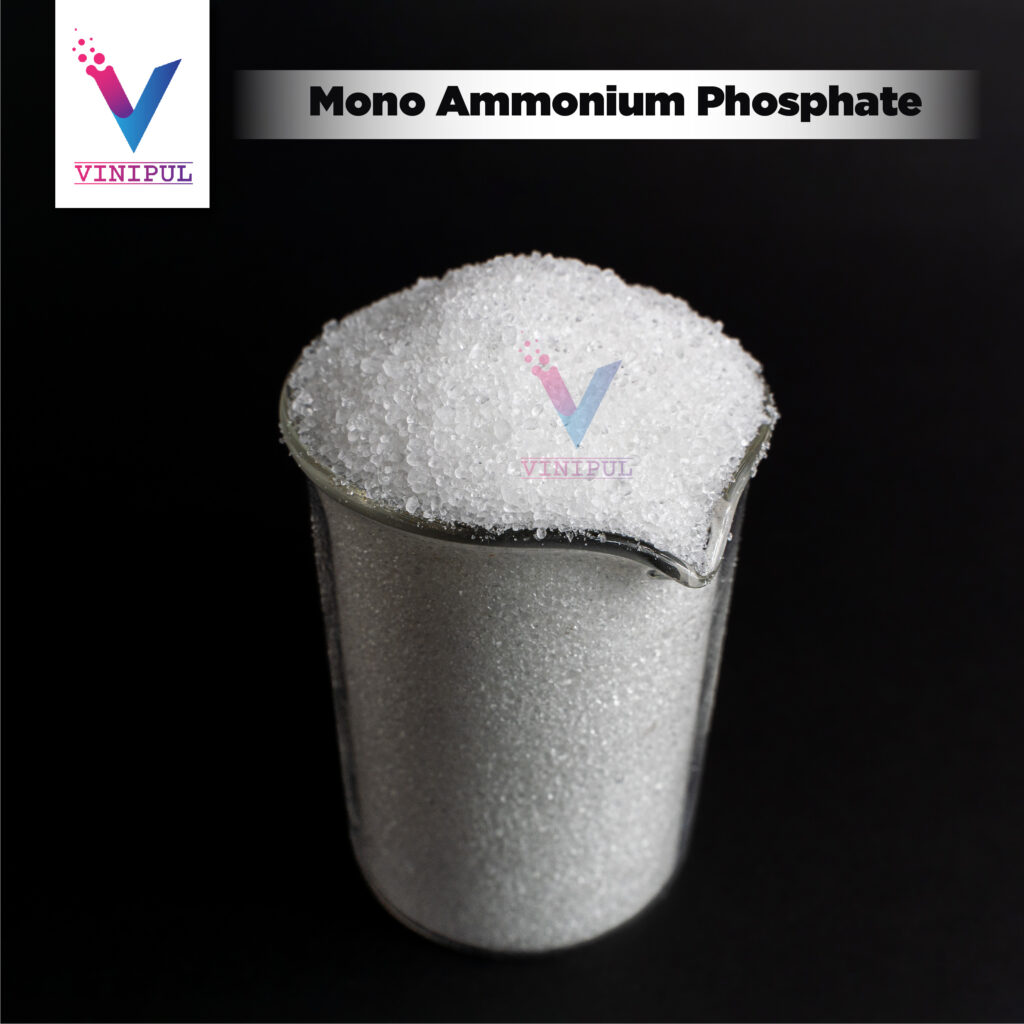Mono Ammonium Phosphate Manufacturer and Supplier
Mono Ammonium Phosphate
Mono Ammonium Phosphate Manufacturers, Mono Ammonium Phosphate Suppliers, Mono Ammonium Phosphate formula, Mono Ammonium Phosphate SDS, Mono Ammonium Phosphate MSDS, Mono Ammonium Phosphate Exporter in Mumbai, India.
Vinipul Chemicals Pvt. Ltd is a renowned manufacturer, supplier, and exporter of high-purity Mono Ammonium Phosphate (CAS No. 7722-76-1) in Mumbai, India. Our company is highly regarded among one of the leading monoammonium phosphate manufacturers for producing specialty chemicals with an emphasis on accurate composition and impurity-free Mono Ammonium Phosphate. We achieve this by using superior purity chemicals sourced from trusted suppliers and employing the latest manufacturing equipment that adheres to international industry standards.
At Vinipul Chemicals, we take great pride in offering [NH4]H2PO4 of the finest quality. As a reliable Mono Ammonium Phosphate suppliers, our product is carefully formulated to meet precise composition requirements, ensuring consistent and reliable performance. Moreover, our Mono Ammonium Phosphate exhibits a long shelf life, providing customers with a reliable and durable solution for their specific needs. With a commitment to excellence and customer satisfaction, Vinipul Chemicals Pvt. Ltd is the trusted monoammonium phosphate manufacturers in India for high-quality products.
What is Mono Ammonium Phosphate?
MAP Mono Ammonium Phosphate is a chemical compound with the formula [NH4]H2PO4. It is commonly used as a source of phosphorus and nitrogen in various industrial and agricultural applications. Mono Ammonium Phosphate is a white crystalline powder that is highly soluble in water, making it easy to use and effective in different formulations.
Mono Ammonium Phosphate (MAP) is an important component of powdered suspension fertilizers. Mono ammonium phosphate powder can be dissolved in water to create a clear solution, making it suitable for foliar spraying or adding to irrigation water. High-purity MAP, made with pure H3PO4, typically contains a P2O5 equivalent content of 61%.
One of the advantages of MAP is its good storage and handling properties. The presence of certain chemical impurities, such as iron and aluminium, can act as natural conditioners to prevent caking. However, highly pure MAP may require additional care during handling to avoid clumping and caking. It is important to employ proper management practices to minimize nutrient loss to surface or drainage water when using any phosphorus fertilizers, including MAP.
Mono Ammonium Phosphate Details
This table provides information about Mono Ammonium Phosphate, a chemical compound with the CAS No. 7722-76-1 and EC Number. 231-764-5. The table also lists various Monobasic ammonium phosphate synonyms and common names. The table contains Mono Ammonium Phosphate structure, Mono Ammonium Phosphate solubility and molecular formula. It is a white granular powder of monoclinic crystals. Mono Ammonium Phosphate pH. value is also mentioned in the table. Mono Ammonium Phosphate is commonly used in various industries in different applications. It is also used in the pharmaceutical industry for various purposes.
Specifications
| Chemical name | Mono Ammonium Phosphate |
| CAS No | 7722-76-1 |
| EC Number | 231-764-5 |
| Commercial name / Synonyms | Ammonium dihydrogen phosphate, 7722-76-1, Ammonium biphosphate, MONOAMMONIUM PHOSPHATE, Phosphoric acid, monoammonium salt, Ammonium acid phosphate, Ammonium dihydrogen orthophosphate, Ammonium monophosphate, Ammonium dihydrophosphate |
| Molecular formula | [NH4]H2PO4 H6NO4P |
| Chemical Structure | 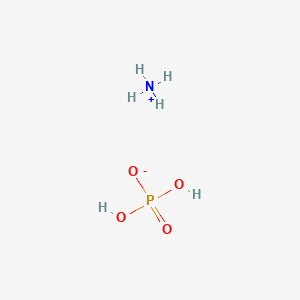 |
| Melting Point | 190 °C |
| IUPAC Name | azanium-dihydrogen phosphate |
| Component Compounds | Ammonia Phosphoric Acid |
| Physical Form | White, tetrahedral Crystals |
| Physical Appearance | Dry Powder / Pellets Large Crystals / Liquid / Other Solid |
| Solubility | insoluble in ethanol insoluble in acetone |
| Solubility in Water | (g/dL) 28 (10 °C) 36 (20 °C) 44 (30 °C) 56 (40 °C) 66 (50 °C) 81 (60 °C) 99 (70 °C) 118 (80 °C) 173 (100 °C) |
| pH | pH of 0.2 Molar aq soln: 4.2 |
| Packaging Details | 25 kg / 50 kg / HDPE packaging bags / Drum/ As per Client’s requirements |
Computed Properties
The table provides various properties of a chemical compound, including Mono Ammonium Phosphate molecular weight, hydrogen bond acceptor and donor counts, an exact mass and mono-isotopic mass, heavy atom counts, and a topological polar surface area. These properties are useful in identifying and characterizing the compound for various purposes in industries such as pharmaceuticals and chemicals.
| Property Name | Property Value |
| Molecular Weight | 115.03 g/mol |
| Hydrogen Bond Donor Count | 3 |
| Hydrogen Bond Acceptor Count | 4 |
| Exact Mass | 115.00344467 g/mol |
| Monoisotopic Mass | 115.00344467 g/mol |
| Heavy Atom Count | 6 |
| Topological Polar Surface Area | 81.6Ų |
| Complexity | 49.8 |
| Covalently-Bonded Unit Count | 2 |
| Compound Is Canonicalized | Yes |
Related Compounds with Annotation
The table provides information on various compounds and their properties related to Mono Ammonium Phosphate. The columns include the structure image, structure name, compound CID, neighbour type, and annotation types count. The compounds listed range from different types of ammonium phosphates, phosphoric acid salts, and other related compounds. The annotation types count indicates the number of different annotations associated with each compound. Overall, the table gives an overview of the compounds and their corresponding properties.
Mono Ammonium Phosphate Price
If you are looking to purchase Mono Ammonium Phosphate, it’s important to know the current market price. Mono Ammonium Phosphate price can vary depending on various factors. Vinipul Chemicals offers the best price in the market listed below: –
| Product Range | Price |
| Product Range | Price |
| Mono Ammonium Phosphate Technical | Rs 40/kg |
| Mono Ammonium Phosphate Pure | Rs 45/kg |
| Mono Ammonium Phosphate 99% | Rs 78/kg |
| Mono Ammonium Phosphate ETP Grade | Rs 65/kg |
| Ammonium Phosphate Monobasic | Rs 100/Kg |
| Monoammonium Salt | Rs 90/Kg |
| Monoammonium Dihydrogen Phosphate | Rs 115/kg |
| Mono Ammonium Hydrogen Ortho Phosphate | Rs 115/kg |
| Monoammonium Phosphate Crystal | Rs 125/kg |
Prices shown above are provisional prices and may change due to different market conditions for latest prices
Call Us
+91-932 223 1817
Mail Us
business@vinipulchemicals.com
Types of Mono Ammonium Phosphate
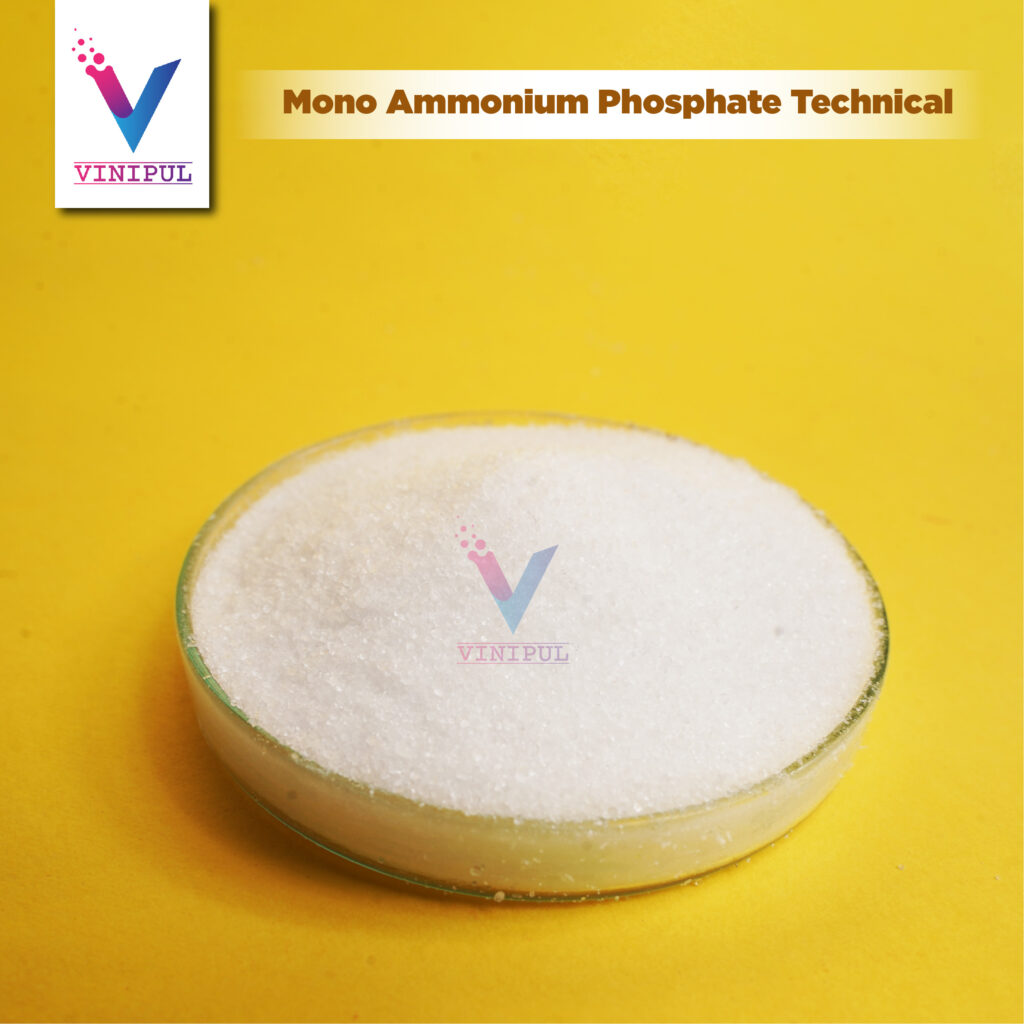
Mono Ammonium Phosphate Technical
This type of Mono Ammonium Phosphate (MAP) refers to a grade of MAP that is primarily used for technical purposes rather than agricultural applications. It may have slightly different specifications and impurity levels compared to MAP intended for fertilizers.
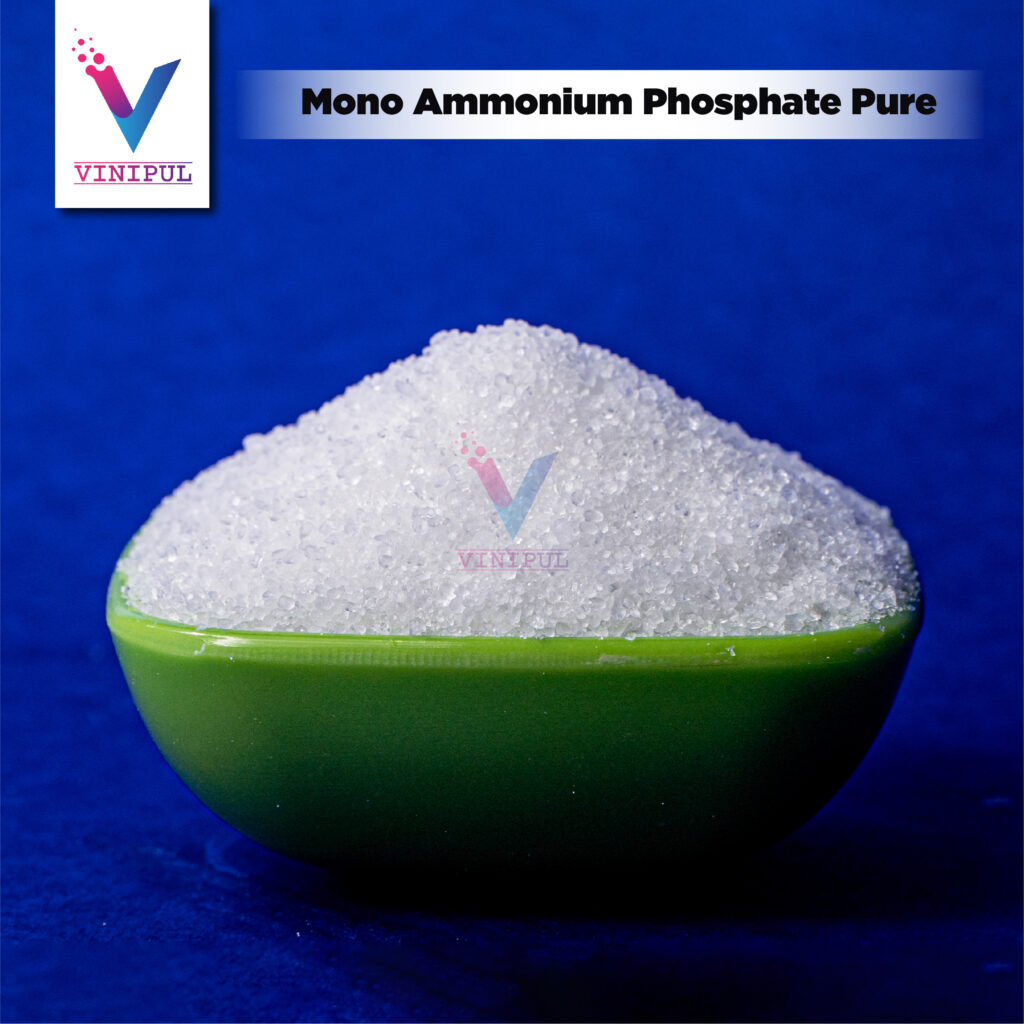
Mono Ammonium Phosphate Pure
Mono Ammonium Phosphate Pure is a highly refined grade of MAP that is known for its high purity and minimal impurities. It is commonly used in industries where a precise and pure source of phosphorus and nitrogen is required, such as in laboratory settings or for specialized manufacturing processes.
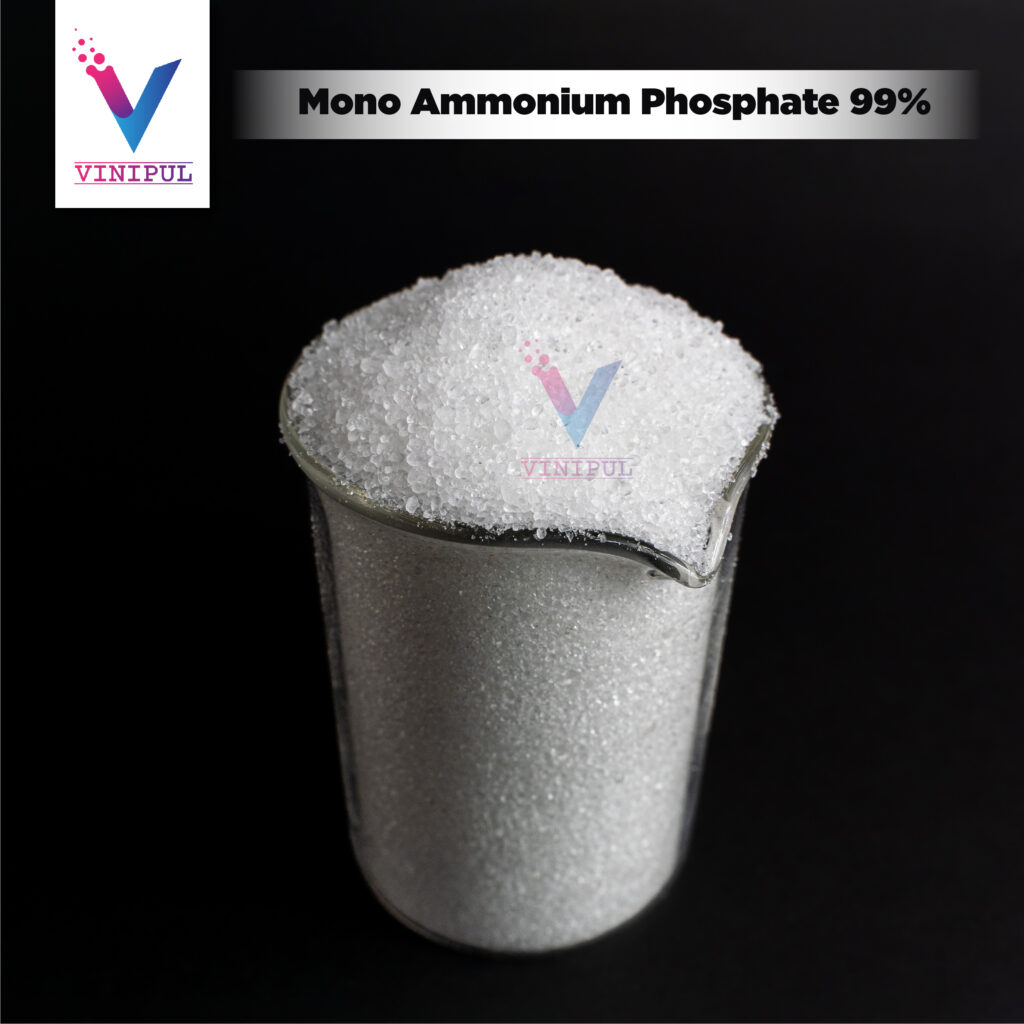
Mono Ammonium Phosphate 99%
This type of MAP is characterized by its high concentration of phosphorus and nitrogen, with a purity level of 99%. It is commonly used in agricultural applications as a fertilizer, providing essential nutrients to plants for optimal growth and development.
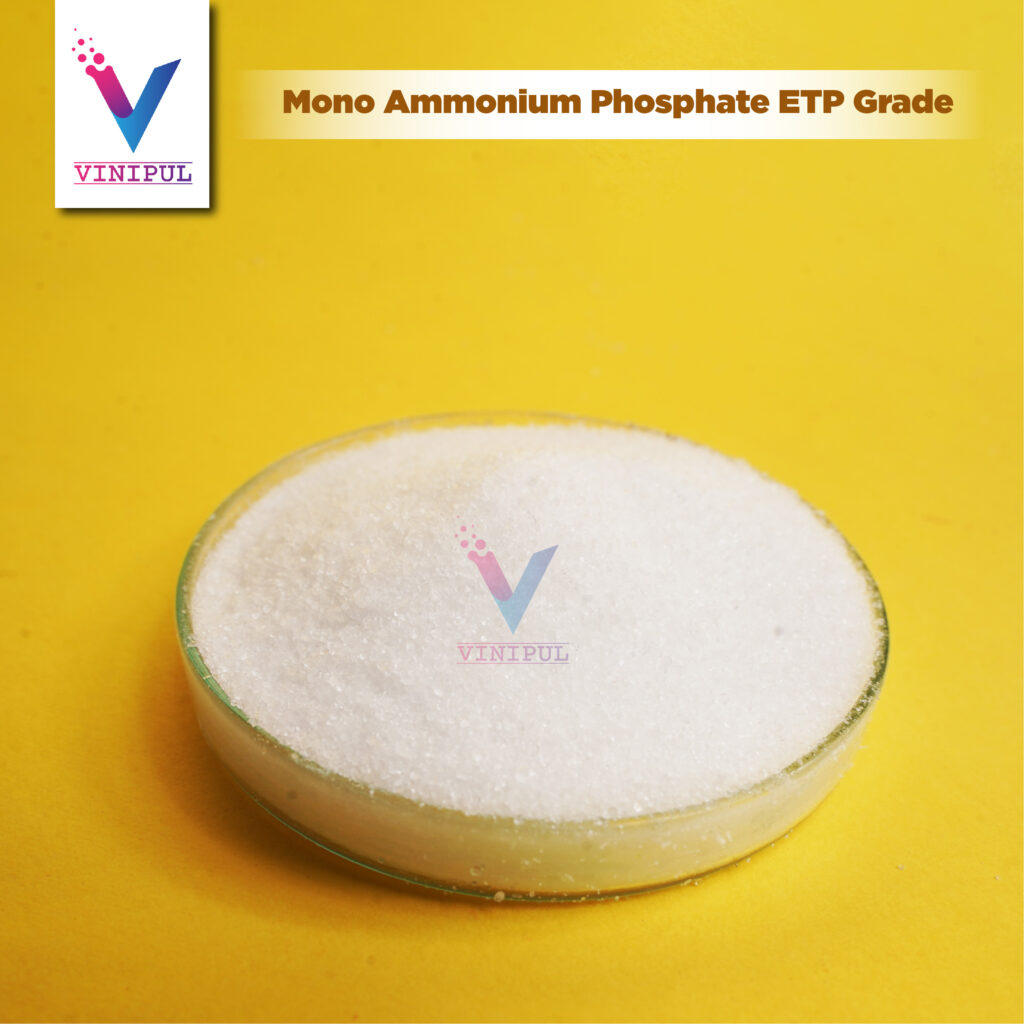
Mono Ammonium Phosphate ETP Grade
ETP stands for Effluent Treatment Plant. Mono Ammonium Phosphate ETP Grade refers to a specific grade of MAP that is suitable for use in wastewater treatment processes. It is designed to meet the requirements of effluent treatment plants and aid in the removal of pollutants from industrial or municipal wastewater.
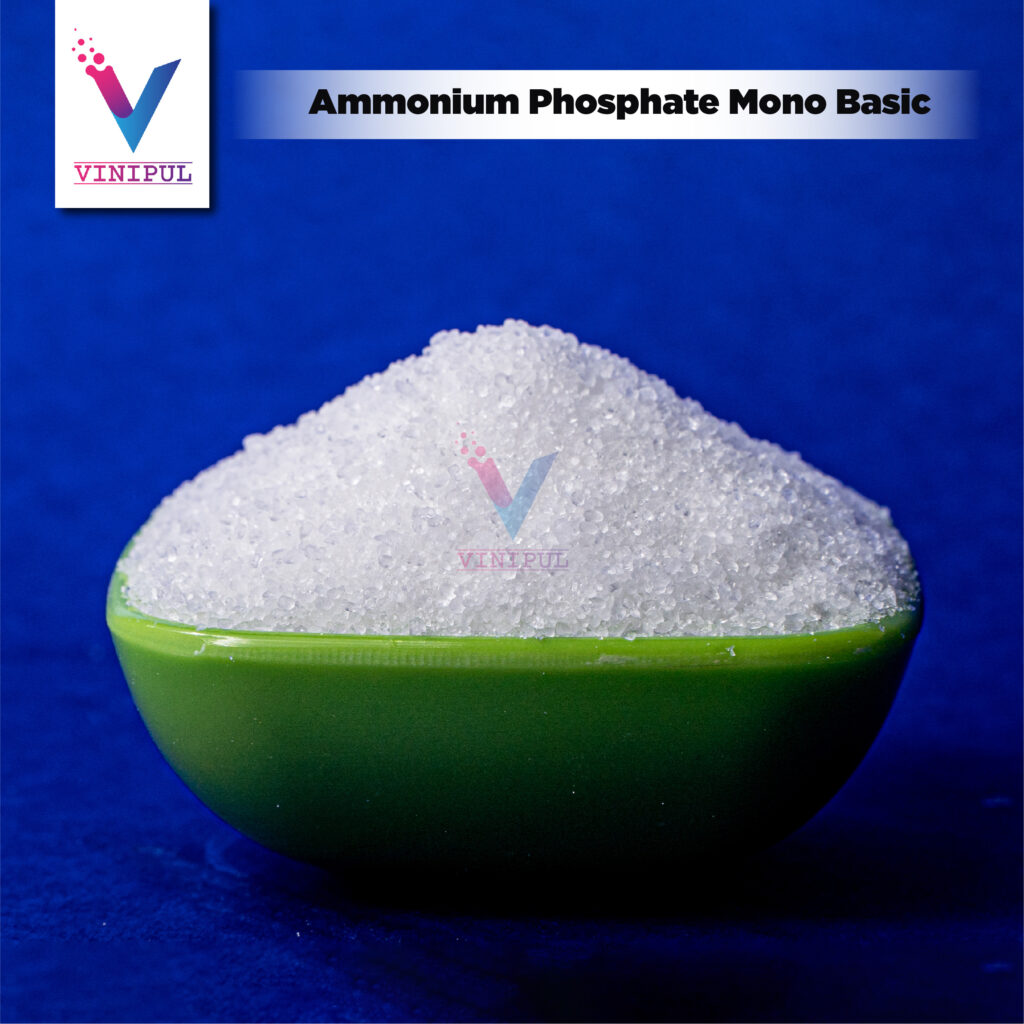
Ammonium Phosphate Monobasic
Ammonium Phosphate Monobasic is a compound closely related to Mono Ammonium Phosphate. Monobasic ammonium phosphate is commonly used as a fertilizer and fire retardant. While it shares similarities with MAP, there may be differences in the specific composition and application of these two compounds.
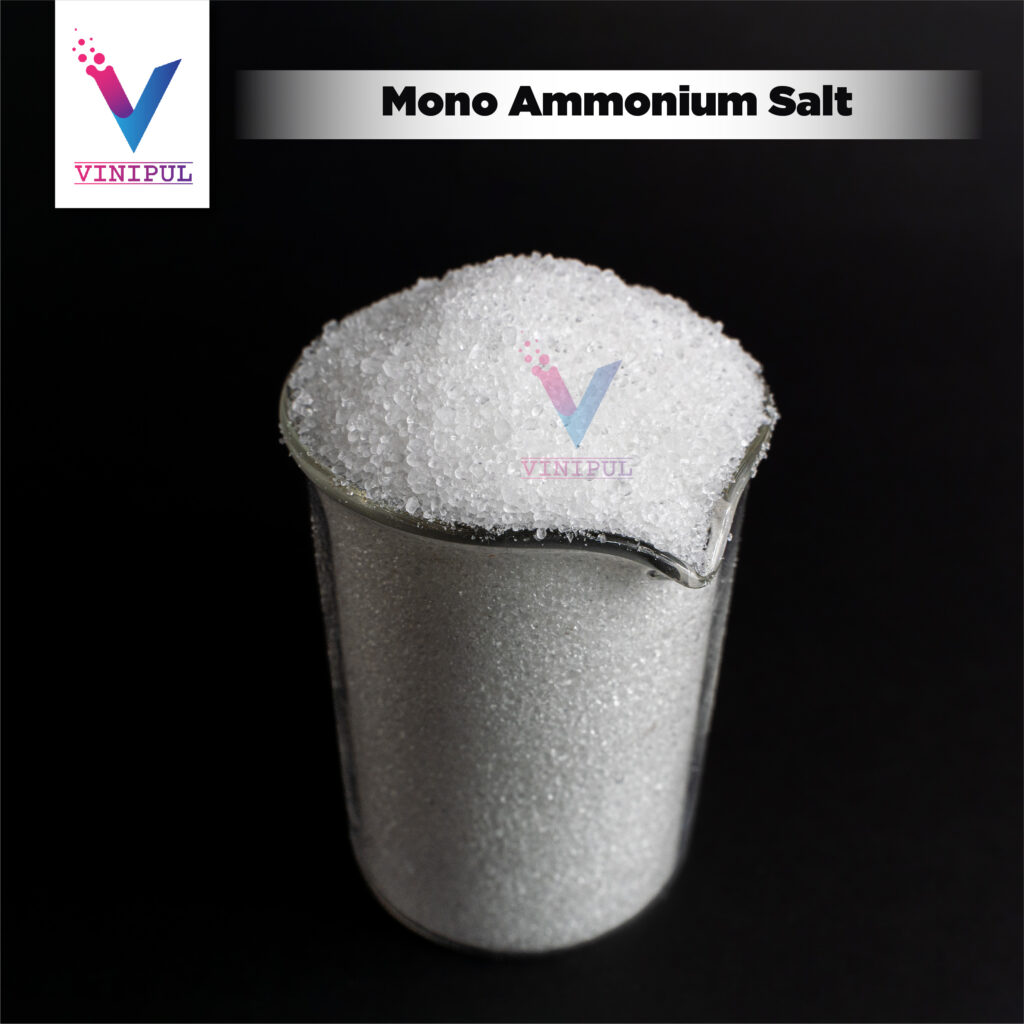
Monoammonium Salt
Monoammonium Salt is a general term that refers to any salt compound containing the monoammonium ion, NH4+. In the context of fertilizers, it typically refers to Mono Ammonium Phosphate (MAP), which is the monoammonium salt of phosphoric acid.
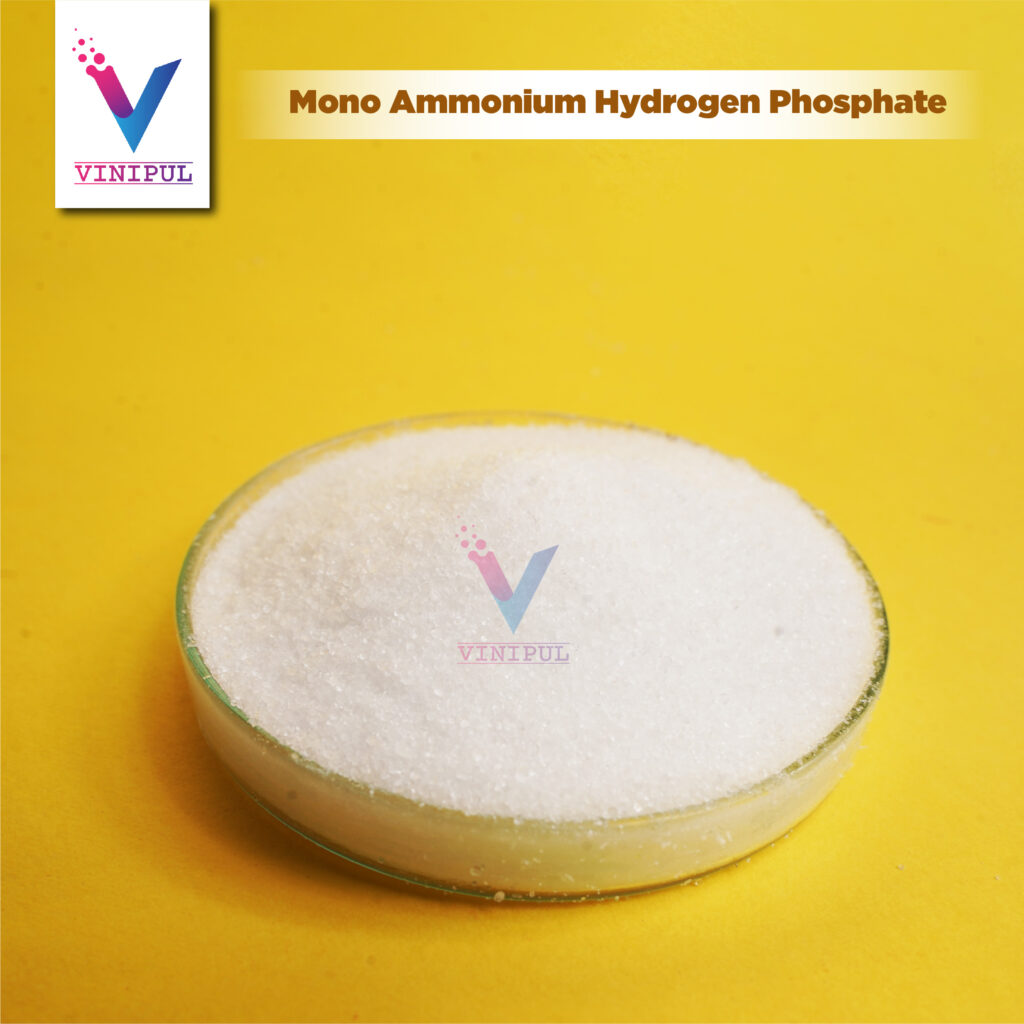
Monoammonium Dihydrogen Phosphate
Monoammonium Dihydrogen Phosphate is another name for Mono Ammonium Phosphate (MAP). It highlights the chemical composition of MAP, which consists of the monoammonium.
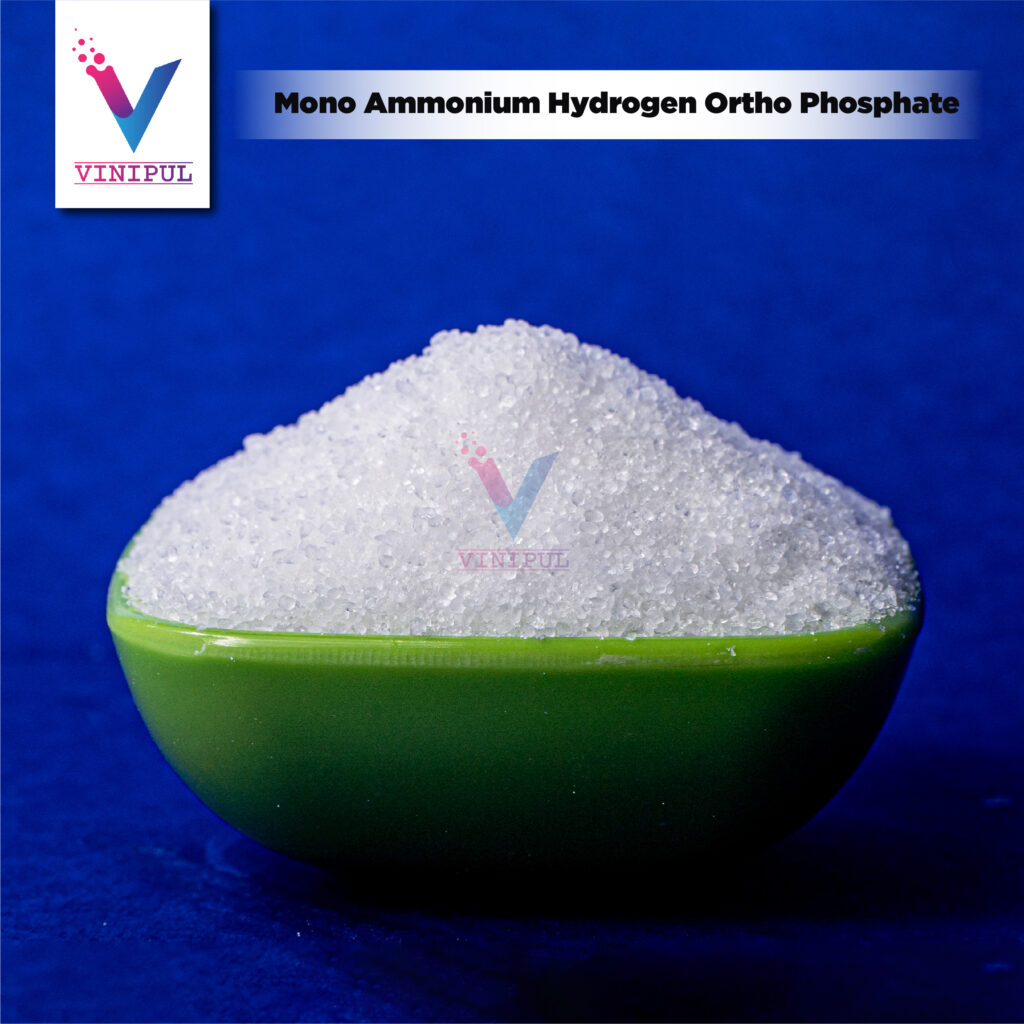
Mono Ammonium Hydrogen Ortho Phosphate
Mono Ammonium Hydrogen Ortho Phosphate is yet another name for Mono Ammonium Phosphate (MAP). It emphasizes the orthophosphate form of phosphorus.
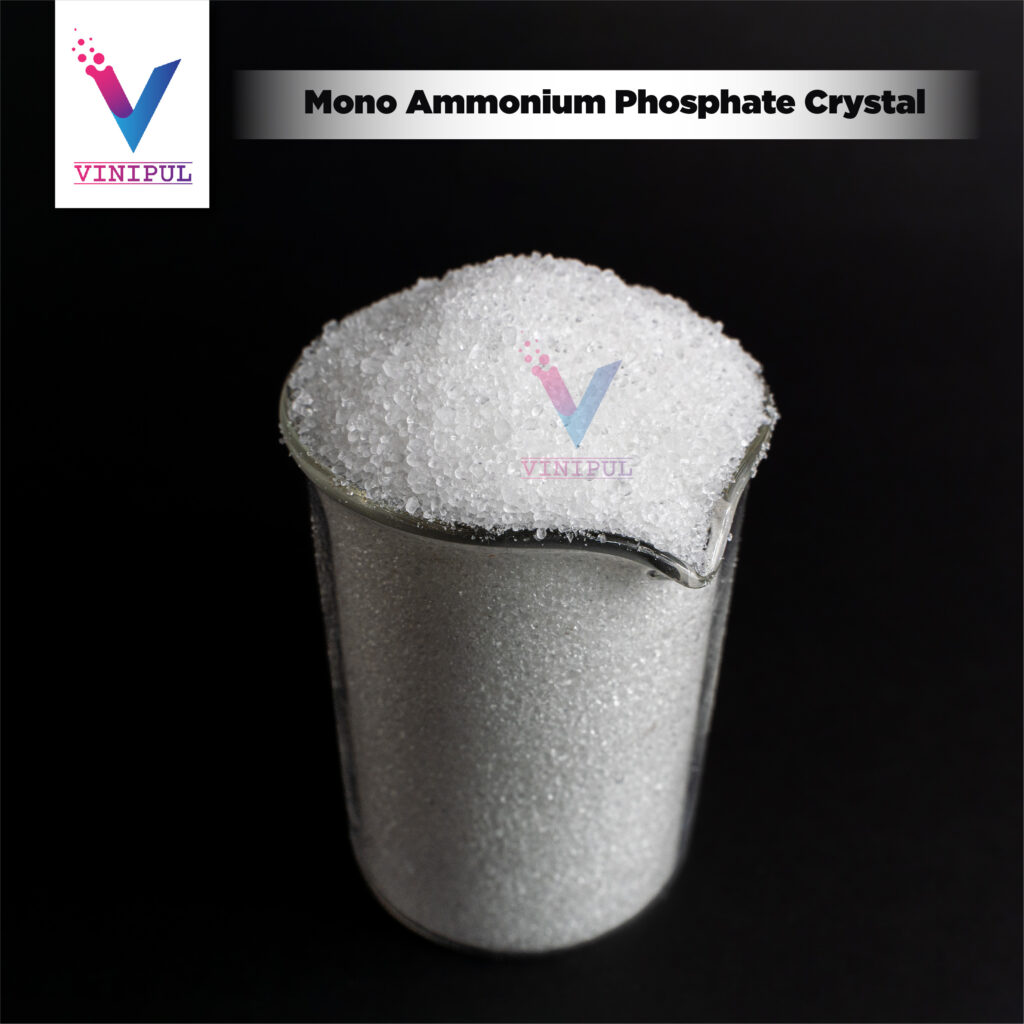
Monoammonium Phosphate Crystal
Monoammonium Phosphate Crystal refers to MAP that is in a crystalline form. Mono ammonium phosphate crystals may have different physical characteristics compared to other forms of MAP, but its chemical composition and application remain the same.
Mono Ammonium Phosphate Manufacturing Process
Mono Ammonium Phosphate chemical formula is a commonly utilized fertilizer that provides a valuable source of phosphorus (P) and nitrogen (N) for plants. It contains the highest concentration of phosphorus among solid fertilizers widely available in the industry.
The manufacturing process of MAP is relatively straightforward. In one method, ammonia (NH3) and phosphoric acid (H3PO4) are combined in a one-to-one ratio, resulting in a slurry of MAP that is then solidified into granules using a granulator. Another method involves introducing the two starting materials into a pipe-cross reactor, where the reaction generates heat, evaporates water, and solidifies MAP. Other manufacturing methods also exist. One advantage of MAP production is that it can use lower-quality H3PO4 compared to other phosphorus fertilizers, which often require a higher grade of acid. The phosphorus pentoxide (P2O5) equivalent content of MAP can range from 48 to 61 percent, depending on the impurity levels in the acid. The most commonly used fertilizer composition of MAP is 11-52-0. No special precautions are necessary when using MAP. The slight acidity associated with this fertilizer reduces the potential for NH3 loss to the air, and it can be safely placed near germinating seeds without causing harm. However, when using MAP in foliar sprays or adding it to irrigation water, it is important to avoid mixing it with calcium or magnesium fertilizers.
What is the difference between MAP and DAP fertilizer?
The primary distinction between di-ammonium phosphate (DAP) and mono-ammonium phosphate (MAP) lies in their respective nitrogen and phosphorus content. DAP fertilizer typically contains approximately 18% nitrogen, while MAP fertilizer contains around 10% nitrogen. In terms of phosphorus content, MAP fertilizer contains about 50%, while DAP fertilizer contains approximately 46%.
Is sodium acid pyrophosphate a buffer?
Sodium Acid Pyrophosphate (SAPP) is a versatile compound widely utilized in multiple industries, including food, oil drilling, detergents, and chemical stabilization. In the food industry, SAPP serves various functions such as buffering, leavening, modifying, emulsifying, providing nutrients, and preserving canned goods.
As a buffering agent, SAPP helps regulate and maintain the pH levels of food products. By preventing drastic changes in acidity or alkalinity, it ensures consistent taste, texture, and appearance in a wide range of food items.
Is monoammonium phosphate organic?
Monoammonium phosphate (MAP) is not considered organic. It is a synthetic fertilizer produced through a chemical process using ammonia and phosphoric acid. Organic fertilizers, on the other hand, are derived from natural sources such as plant and animal materials. They undergo minimal processing and are in compliance with organic farming standards, which prohibit the use of synthetic substances. While MAP is widely used in agriculture for its phosphorus and nitrogen content, it does not meet the criteria for organic certification.
What is the benefit of monoammonium phosphate?
MAP fertilizer contains nitrogen, which plays a crucial role in enhancing photosynthesis by promoting the production of chlorophyll in plants. Additionally, MAP fertilizer contributes to the process of cell division, thereby supporting healthy growth and development in plants. It also aids in nitrogen fixation in leguminous crops, which is essential for their growth and productivity. Moreover, the application of MAP fertilizer can help improve the tolerance of plants against various diseases, thereby promoting their overall health and vitality.
Industrial Applications
Mono Ammonium Phosphate (MAP) finds a wide range of industrial applications due to its high phosphorus and nitrogen content. Some common industrial applications of MAP are:

Agriculture
MAP is highly beneficial for neutral- and high-pH soils as a fertilizer. It is applied by spreading it across fields and mixing it into the surface soil, providing essential nutrients to support plant growth.

Water Treatment
MAP is employed in water treatment processes, such as in the treatment of industrial wastewater and municipal water systems. It assists in the removal of contaminants and acts as a source of nutrients for beneficial bacteria in biological treatment systems.

Metal Surface Treatment
MAP is utilized in metal surface treatment applications, such as metal cleaning, pickling, and surface preparation. It helps in the removal of impurities, rust, and scales fro

Textile Industry
MAP is used in the textile industry as a flame-retardant agent for fabrics and textiles. It helps improve the fire resistance of textiles, making them safer in various applications such as upholstery, curtains, and protective clothing.

Food Industry
MAP is sometimes added to food products as a source of phosphorus and nitrogen. It can be used as a food additive in baking powders, yeast, and as a nutrient supplement in certain food processing applications.

Pharmaceutical Industry
MAP finds application in the pharmaceutical industry for its use as a buffering agent in medications and tablets. It helps maintain the desired pH level and stability of certain pharmaceutical formulations.
These are just a few examples of the diverse industrial applications of Mono Ammonium Phosphate. Its versatility, combined with its nutrient-rich composition, makes it a valuable ingredient in various industrial processes.
Mono Ammonium Phosphate Uses
Mono Ammonium Phosphate (MAP) is a versatile compound with numerous applications in various industries. Here are some common uses of Mono Ammonium Phosphate:
- Fertilizer Manufacturing: MAP is extensively used as a key ingredient in the production of fertilizers. Its high phosphorus content makes mono ammonium phosphate fertilizer an effective source of nutrients for plants, promoting healthy growth and improved crop yields.
- Animal Feed: Due to its high purity, MAP is used as a feed ingredient for animals. It serves as a valuable source of nutrients, contributing to the overall health and well-being of livestock.
- Industrial Chemicals: MAP is employed in agricultural chemicals (non-pesticidal) and as a component in pigments, ink, toner, and colorant products. It also finds application as a processing aid in various industries.
- Fire Protection: Mono Ammonium Phosphate is utilized as a flame retardant for cellulosic materials like plywood, papers, and fabrics. It helps reduce the flammability of these materials, enhancing fire safety.
- Manufacturing: MAP has diverse applications in manufacturing processes. It is used in the production of bread as a bread improver, ceramic binders, and to prevent afterglow in matches. It is also employed in analytical chemistry and underwater sounding equipment.
- Fire Extinguishers: Dry chemical fire extinguishers commonly found in offices, schools, and homes use finely powdered MAP as a fire suppressant. It disperses rapidly, coating the fuel and smothering the flames.
These are just a few examples of the wide-ranging applications of Mono Ammonium Phosphate. Its versatility and unique properties make it an essential component in various industries.
About Company
Vinipul Chemicals Pvt. Ltd is a reputable company recognized as a leading manufacturer, supplier, and exporter of high-purity Mono Ammonium Phosphate (MAP) and a wide range of other chemicals. With a strong commitment to quality, Vinipul Chemicals has established itself as a trusted name in the industry.
At Vinipul Chemicals, we take pride in our ability to produce Mono Ammonium Phosphate of exceptional purity. Our MAP is manufactured using superior quality chemicals and state-of-the-art equipment, ensuring accurate composition and impurity-free products. Complying with international industry standards, we guarantee the finest quality MAP that meets the precise requirements of our customers. As a renowned manufacturer, supplier, and exporter, Vinipul Chemicals has gained a strong foothold in the market, thanks to our unwavering commitment to quality, reliability, and customer service. We aim to be the preferred choice for customers seeking high-purity Mono Ammonium Phosphate and other chemical solutions, consistently meeting their expectations and surpassing industry standards.
FAQ's
Yes, Mono Ammonium Phosphate can be used in organic farming. However, it is important to check with the relevant organic certification authorities to ensure it complies with their guidelines.
Mono Ammonium Phosphate is suitable for a wide range of crops, including field crops, fruits, vegetables, and ornamental plants. It can be used in various soil types and climates.
MAP is commonly applied as a dry granular fertilizer, which can be broadcasted, side-dressed, or used in seed furrows during planting. It can also be dissolved in water for foliar application.
When buying Mono Ammonium Phosphate, consider factors such as the purity of the product, the nutrient content (nitrogen and phosphorus percentages), granule size, and any additional additives or coatings.
MAP has a relatively long shelf life if stored properly. When stored in a cool, dry place away from moisture and direct sunlight, it can remain viable for several years.
While MAP is generally considered safe to handle, it is recommended to wear protective gloves and goggles when working with the product. Follow the manufacturer’s instructions and guidelines for safe handling.
Yes, Mono Ammonium Phosphate can be mixed with other fertilizers to create customized blends based on specific crop requirements. However, compatibility and solubility of the fertilizers should be considered, and it’s best to consult with experts or refer to manufacturer guidelines.
Yes, MAP can be used in fertigation or drip irrigation systems. It dissolves easily in water, allowing for precise application and efficient nutrient uptake by plants.
MAP, like any fertilizer, should be used responsibly to prevent over-application and potential environmental impacts. Following recommended application rates and practices can minimize any negative effects.
Yes, MAP can be used in hydroponic or soilless farming systems. It can be dissolved in the nutrient solution to provide essential phosphorus and nitrogen to the plants.
MAP is commonly available at Vinipul Chemicals Pvt. Ltd is a renowned manufacturer, supplier, and exporter of high-purity Mono Ammonium Phosphate.
Different countries may have specific regulations and restrictions on the sale, distribution, and use of MAP. It is essential to comply with local laws and regulations governing fertilizer use.
While MAP is primarily used as a fertilizer, it may have some non-agricultural applications such as fire extinguisher agents, as a component in pharmaceuticals, or in industrial processes. However, its
Market Area
We supply and exports Mono Ammonium Phosphate in all parts of the world such as
Mono Ammonium Phosphate in Africa Countries
South Africa , Nigeria, Kenya, Ghana, Ethiopia, Tanzania, Algeria, Angola, Benin, Botswana, Burkina Faso, Burundi, Cabo Verde, Cameroon, Central African Republic (CAR), Chad, Comoros, Democratic Republic of the Congo, Côte d’Ivoire, Djibouti, Egypt, Equatorial Guinea, Eritrea, Gabon, Gambia, Guinea, Guinea-Bissau, Lesotho, Liberia, Libya, Madagascar, Malawi, Mali, Mauritania, Mauritius, Morocco, Mozambique, Namibia, Nigeria, Rwanda, Sao Tome and Principe, Senegal, Seychelles, Sierra Leone, Somalia, South Sudan, Sudan, Swaziland, Togo, Tunisia, Uganda, Zambia, Zimbabwe.
Mono Ammonium Phosphate in Gulf Countries
Oman, Qatar, Kuwait, Saudi Arabia, Dubai, Bahrain, Iran, United Arab Emirates
Mono Ammonium Phosphate in Asia Countries
Afghanistan, Armenia, Azerbaijan, Bahrain, Bangladesh, Bhutan, Brunei, Cambodia, China, Cyprus, Georgia, India, Indonesia, Iran, Iraq, Israel, Japan, Jordan, Kazakhstan, Kuwait, Kyrgyzstan, Laos, Lebanon, Malaysia, Maldives, Mongolia, Myanmar (Burma), Nepal, North Korea, Oman, Pakistan, Palestine, Philippines, Qatar, Russia, Saudi Arabia, Singapore, South Korea, Sri Lanka, Syria, Taiwan, Tajikistan, Thailand, Timor-Leste, Turkey, Turkmenistan, United Arab Emirates (UAE), Uzbekistan, Vietnam, Yemen
We supply Mono Ammonium Phosphate in all parts of India.
Andhra Pradesh, Arunachal Pradesh, Assam, Bihar, Chhattisgarh, Goa, Gujarat, Haryana, Himachal Pradesh, Jammu & Kashmir, Jharkhand, Karnataka, Kerala, Madhya Pradesh, Maharashtra, Manipur, Meghalaya, Mizoram, Nagaland, Odisha, Punjab, Rajasthan, Sikkim, Tamil Nadu, Telangana, Tripura, Uttarakhand, Uttar Pradesh and West Bengal.
Note: – Please be advised that the information contained in this document is intended for illustrative purposes only. Due to variations in product grade, applications, industries, or uses, the accuracy of the information provided cannot be guaranteed. © Copyright 2023 © Vinipul Chemicals All Rights Reserved (Terms of Use). Reproduction of any material from this site is strictly prohibited without permission. Vinipul Chemicals products are exclusively sold through the company’s website. For precise product specifications and requirements, as well as advice on which products are best suited for your specific application needs, please contact us at business@vinipulchemicals.com Use Terms | Privacy.

